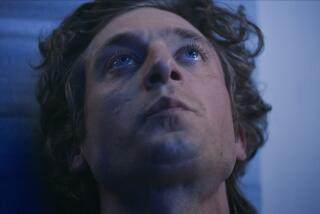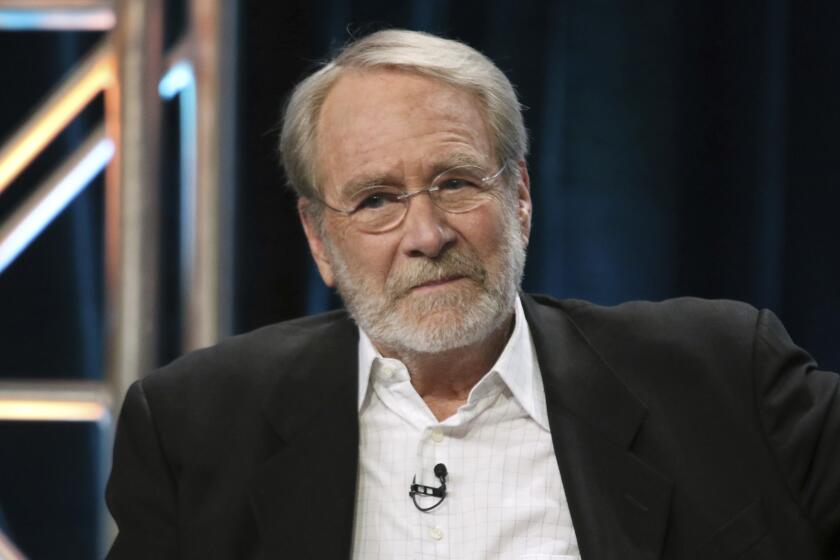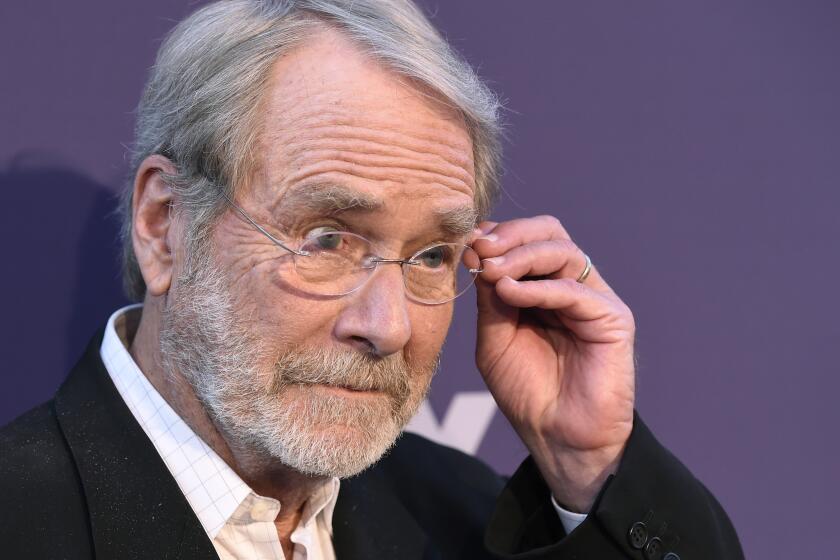Saluting Rosa : An American Cinematheque series honors a fearless international pioneer in gay cinema.
The American Cinematheque’s “Homosexual Revolution: A Tribute to Rosa von Praunheim,” which honors a fearless international pioneer in gay cinema, commences at Raleigh Studios’ Chaplin Theater Friday at 7:15 p.m. with the local premiere of the first 56-minute segment of Von Praunheim’s “100 Years of the Gay Movement,” a joyous celebration of the rich diversity in San Francisco’s gay, lesbian, bisexual and trans-gendered community.
It will be followed by his 78-minute “Transsexual Menace,” a highly compassionate survey of the experiences and views not only of transsexuals but also cross-dressers. It is yet another study indicative that gender-bending individuals are increasingly feeling free to be whatever, whoever and however they want to be. (The film’s potentially misleading title refers to a militant transsexual group that stages public protests and demonstrations.)
Von Praunheim, who will appear at selected screenings the first two weekends of the three-weekend series, will present his stage act, “55 Years of Perversity,” Friday at 7:15 p.m.
Screening Friday and Saturday at 9:30 p.m. will be “It’s Not the Homosexual Who Is Perverse, but the Situation in Which He’s Forced to Live” (1971), a timeless landmark in gay cinema of enduring importance. Von Praunheim attempts no less than a satire of gay values and lifestyles, showing them to be self-destructive parodies of straight middle-class mores. He follows the “Candide”-like odyssey of a naive, ordinary young gay man who arrives in Berlin only to become all but devoured by a ruthless, materialistic, sexually obsessed gay society.
“It’s Not” will be followed both evenings by “Army of Lovers or Revolt of the Perverts” (1972-79), a rambling but vital and comprehensive documentary on gay liberation in America, culminating in a notorious--at the time--X-rated sequence.
“Tally Brown, New York” (1977), screening Saturday at 7:15 p.m., is the first of Von Praunheim’s portraits of women, usually aging legendary performers who have become cult figures among gays.
Brown is a hefty, bizarre-looking cabaret singer of exquisite diction and compelling presence, a remarkably candid and perceptive woman, a determinedly brave and free spirit who was part of the glittering Andy Warhol world of the ‘70s. With appearances by Warhol, Holly Woodlawn, Taylor Mead, Divine and other legendary scenesters of the day.
The Von Praunheim tribute is presented in association with the German Film Export Union and the Goethe Institute, 5700 Wilshire Blvd., which is presenting a coinciding special exhibit, “One Hundred Years of the Gay Movement in Germany,” which Von Praunheim will open Sept. 11. American Cinematheque: (213) 466-FILM; Goethe Institute, (213) 525-3388.
*
The UCLA Film Archive’s “Retrospective of Mohsen Makhmalbaf,” which ends Saturday at the James Bridges Theater in Melnitz Hall, offers a group of films revealing the prodigiously gifted Iranian filmmaker’s love of the cinema as a great art form, his fascination with the filmmaking process and his affection for the people involved in making movies.
“Once Upon a Time, Cinema” (1992), which screens tonight at 7:30, is a dazzling, whirling dervish of a movie in which one of the last of Persia’s extravagant Qajar shahs (Ezzatollah Entezami) falls in love with the newly invented movies, and then with one of the Iranian cinema’s early screen heroines.
The heroine magically falls off a cliff only to materialize before the shah’s eyes in the royal Golestan Palace, that fanciful fairy-tale structure still standing in the center of Tehran. Makhmalbaf accomplishes much in this tragicomic Surrealist triumph: He celebrates the magical power of the medium and its unparalleled capacity for blurring reality and fantasy as a way of making a subtle, critical commentary on his country’s chronic censorship of filmmakers. He also celebrates the Iranian cinema itself.
The film’s cinematographer (Mehdi Hashemi), a wistful Chaplin look-alike, meanwhile naively sees the camera as an instrument to tell the truth that will set oppressed people free. One of the most inspired of Makhmalbaf’s countless conceits is to show the shah so carried away with the movies that he wants to become a screen star himself, only to find himself transported from the fantasy life of his palace to the hard lot of the Iranian peasant, as dramatized in a neo-realist-style film.
“Once Upon a Time, Cinema” is constantly exhilarating, alternately hilarious and rueful, at once a glittering evocation and a criticism of glorious Qajar Dynasty extravagance in its final years.
It will be followed by one of Makhmalbaf’s rare disappointments, “The Actor” (1993), which offers an implicit criticism of the status of women in contemporary Iran. That sentiment tends to get lost amid the wearying ranting between a famous roly-poly comedian (Akbar Abdi, playing a character of the same name) and his wife Simin (Fatemah Motamed-Aria). He longs for serious acclaim and artistic challenge but accepts strictly commercial assignments to pay for his wife’s materialistic cravings; she in turn longs for a child obsessively, perceiving no other way of self-fulfillment. In desperation she pays a young deaf-mute Gypsy (Mahaya Petrossian) to move into her home to bear a child for her and her husband. Unlike most of Makhmalbaf’s films, this one is likely to appeal only to Farsi-speaking audiences.
Following the Friday 7:30 p.m. screening of “Close Up,” Abbas Kiarostami’s fascinating-sounding documentary on a man arrested for impersonating Makhmalbaf, is Houshang Gomankani’s “Stardust-Stricken: Mohsen Makhmalbaf--A Portrait.” It is a probing study of the filmmaker in which we discover the sources of his guiding passions--religion and politics--which have shaped his life and career.
Makhmalbaf was born in poverty in Tehran in 1957, was imprisoned five years and also tortured by the Savak, and was widowed when his wife died in a fire. The generous and apt clips from his films reveal a profound sense of the cinematic, but we don’t learn how Makhmalbaf happened to possess such visual genius. (Intriguingly, he invokes the name of Andrei Tarkovsky, the great Russian filmmaker, during his wife’s funeral service.)
There should be a law that Makhmalbaf’s 1995 “Salaam Cinema” (Saturday at 7:30 p.m.) should always be followed by Maani Petgar’s 1996 “Cinema Cinema” (at 9 p.m.). The first is an experiment, in which Makhmalbaf’s advertisement seeking 100 actors was answered by an unruly 5,000 applicants. The second film documents the making of the first.
In “Salaam Cinema” Makhmalbaf--seated in what looks to be the throne room of an old Qajar palace--interviews the would-be actors with a surprising harshness. (“You have 10 seconds to cry.”) What he’s attempting is to elicit authentic emotion, for his applicants do not know that the auditions will in fact compose the film.
In “Cinema Cinema” he comments on what we’ve already observed, that a group of about a half a dozen young women are the standouts--you can forget about most of the men with their imitations of Hollywood heroes. He hopes that “Salaam” actually will be a calling card for those who have passed his tough test.
“Cinema is made of love but also reason and discipline,” observes Makhmalbaf. Explaining the appeal of his films, he says, “In the West they hope to find humanity in the films of the East. There is no loneliness in Iran, and friendship there is a simple thing.” (310) 206-FILM.
More to Read
The biggest entertainment stories
Get our big stories about Hollywood, film, television, music, arts, culture and more right in your inbox as soon as they publish.
You may occasionally receive promotional content from the Los Angeles Times.






